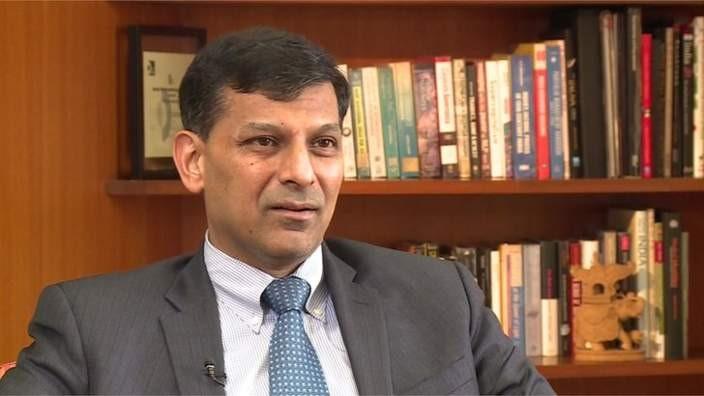'Not all about China,' says India's central banker Rajan
- Published
- comments
Indian central bank governor, Raghuram Rajan: India 'not immune to a China-led slowdown'
In my job, meeting central bankers is par for the course. It goes with the territory.
But it's not every day you meet one like India's Raghuram Rajan. He's been called the "rockstar central banker", "the Bond of banking" and stockbrokers and socialites alike have swooned over Mr Rajan's ability to revive India's economy out of the doldrums, helping it to turn into one of the fastest growing in the world today.
He's done this by keeping a tight watch on inflation, cutting interest rates only when he deems absolutely necessary and improving the country's foreign reserves.
But the recent turmoil in China's stock markets has given even this usually sanguine central banker a reason to reflect.
'Number of concerns'
"Every adverse development across the world affects the rest of the world in some way," he told me in an exclusive interview in his offices in Mumbai, the Indian financial capital.
"It works through financial markets first, then trade later. So it's something that everyone is concerned about. But you have to be careful about attributing everything to China. There are a number of concerns about when interest rates will normalise around the world - and there's also questions about whether some markets are just too high."
Mr Rajan is widely credited for being one of the few voices accurately predicting the global financial crisis in 2008. At the time many scoffed at the concerns he raised, but his gloomy outlook was uncannily accurate.
This time though he doesn't believe there's a financial crisis ahead.
"Based on what I've seen so far there's no strong reason to believe that we're on the verge of another crisis," he says. "But we have to be vigilant about some of those fragilities that have built up."
Some of those fragilities exist far closer to home than Mr Rajan may want to admit.
India's economy may be growing at a faster rate than China's, but some parts of the real economy have yet to feel that growth.
The monsoon is also a big factor in how well the Indian economy does - although agriculture only makes up 17% of the economy, roughly half of the Indian population makes a living through farming, and the monsoon is a key factor in whether rural demand picks up or not.
'Immense burden'
India's rockstar banker has been under political and industry pressure to cut interest rates to boost growth, something that so far he has resisted admirably well (although he has cut three times in the last year).
But he alluded to the challenges central bankers face when they're tasked with the job of fixing their economies.
"I have been a little concerned about the immense burden for action that is falling on central banks and I think it is quite legitimate for central banks to say at some point we can't carry the burden ourselves," he said in answer to a question about what he would do if he was running China's central bank.
"In fact we may not have the tools to do everything that is asked of us. Don't keep asking us to do more because at some point we get into territory where the consequences may be more bad than good if we actually act."
One wonders what his counterparts in China might think of that, given how the markets have read their recent attempts at shoring up confidence in the world's second largest economy.
- Published25 August 2015
